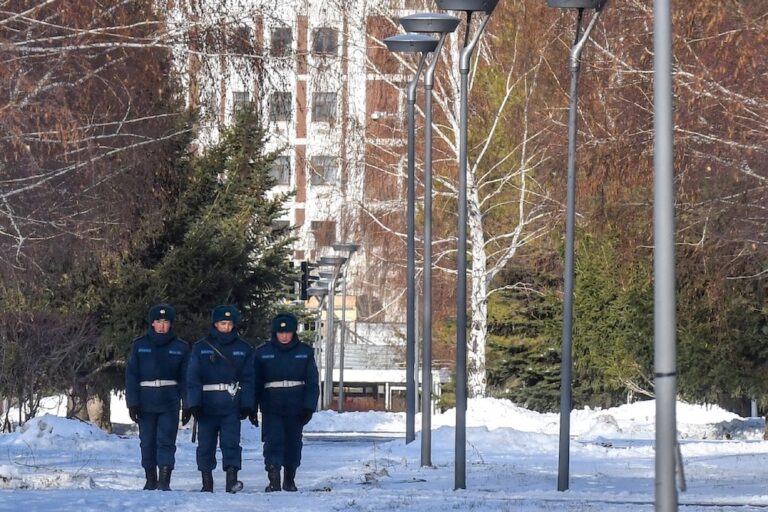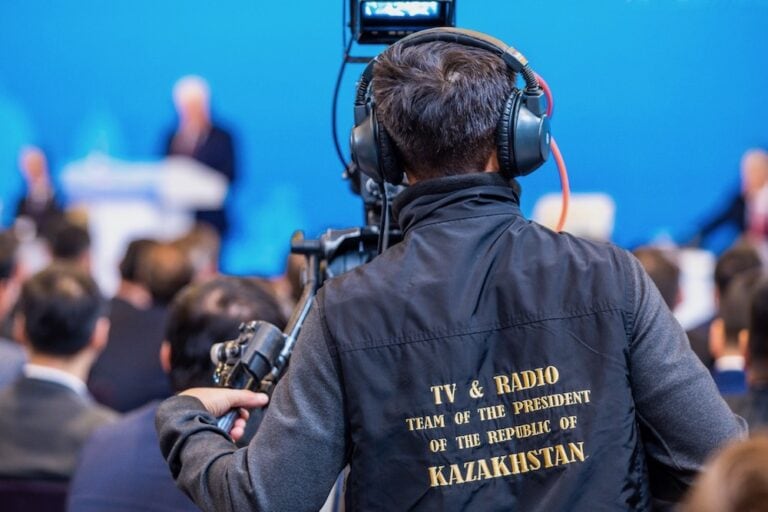The absence of information following several the incidents exemplifies Kazakhstan's lack of progress in protecting and promoting the right to freedom of expression, says ARTICLE 19.
(ARTICLE 19/IFEX) – 19 December 2011 – The absence of information following several violent clashes on 16 December between police and demonstrators in Zhanaozen exemplifies Kazakhstan’s lack of progress in protecting and promoting the right to freedom of expression. ARTICLE 19 outlines the necessary reforms that the Kazakh government must make to demonstrate its genuine commitment to democracy and uphold the rights to freedom of expression and information.
Twenty years ago, when Kazakhstan declared its independence, it enshrined human rights in its constitution, specifically under Article 1, recognising “a human, his life, rights and freedoms as supreme values of the state.” The collapse of the Soviet Union provided a chance to start afresh as an independent democratic state, but with the collapse arose the challenges related to the ability to overcome totalitarian traditions. Kazakhstan joined several international intergovernmental organisations, including the United Nations (UN) and the Organisation for Security and Cooperation in Europe (OSCE), and ratified human rights treaties and committed itself to those organisations’ principles which oblige it, inter alia, to ensure the observance of the right to freedom of expression as part of the International Covenant for Civil and Political Rights. This includes the freedom to seek, receive and impart information and ideas of any sort, regardless of their frontiers.
In 2010, Kazakhstan was elected as the chair of the OSCE and it recently applied for membership of the UN Human Rights Council. However, for the last 20 years, Kazakhstan has made little progress in putting concrete and primary measures in place for necessary reforms to ensure the protection and promotion of freedom of expression in practice. The commitments Kazakhstan promised to fulfil before its OSCE Chairmanship remain unfulfilled. To date, not one existing media outlet can be considered to be independent or free. Intimidation and censorship, including self-censorship, remain a big threat as journalists continue to be attacked and face criminal and civil lawsuits for criticising the Kazakh authorities.
Contrary to recommendations made in the Human Rights National Action Plan in the Sphere of Human Rights for 2009 -2011, no further steps have been undertaken by the Kazakh parliament to implement a consolidated program that provides for concrete steps to improve the legislation, regulating the activities of the mass media in Kazakhstan, and to set a statute of limitations on lawsuits protecting honour and dignity. This lack of progress is visible in the reaction of the authorities to the violent clashes in Zhanaozen, western Kazakhstan, on 16 December, the 20th anniversary of Kazakhstan’s independence from the Soviet Union and the 5th anniversary of the Zheltoksan uprising, a protest which ended in the shooting of hundreds of civilians. Violent clashes between police and protesters on 16 December, following an oil workers’ strike in Zhanaozen, which started seven months ago, resulted in the death of at least 14 people. For three days following the beginning of the clashes, journalists were not allowed to enter the town, phone lines were cut off and internet websites were blocked. On 17 December President Nazarbayev signed an order establishing a state of emergency in the town, which, among other constraints, imposed restrictions on physical access to and from Zhanaozen, the use of certain radio and television equipment, as well as on making audio-visual recordings, and included a prohibition on any public gatherings. Three Russian journalists were detained for several hours without explanation and on the same day, reportedly as a preventive measure, activists of a number of social movements, who were planning to gather in Almaty in support of the Zhanaozen protest, were detained. ARTICLE 19 calls on the Kazakh authorities not to use emergency measures to limit access to information to such an extent that journalists are unable to perform their professional activities and the general public is deprived of relevant information about protests.
ARTICLE 19 reiterates its appeal to the Kazakh government to make a number of principal changes to its legislation and law enforcement practices to ensure freedom of speech, abolish censorship and provide better protection for journalists.
(. . .)


